Demolition Contractors Lindenhurst
Find top Demolition Services in Lindenhurst
Receive 3 FREE Demolition Contractors quotes for your project today! Compare profiles, reviews, accreditations, portfolio, etc... and choose the best service.
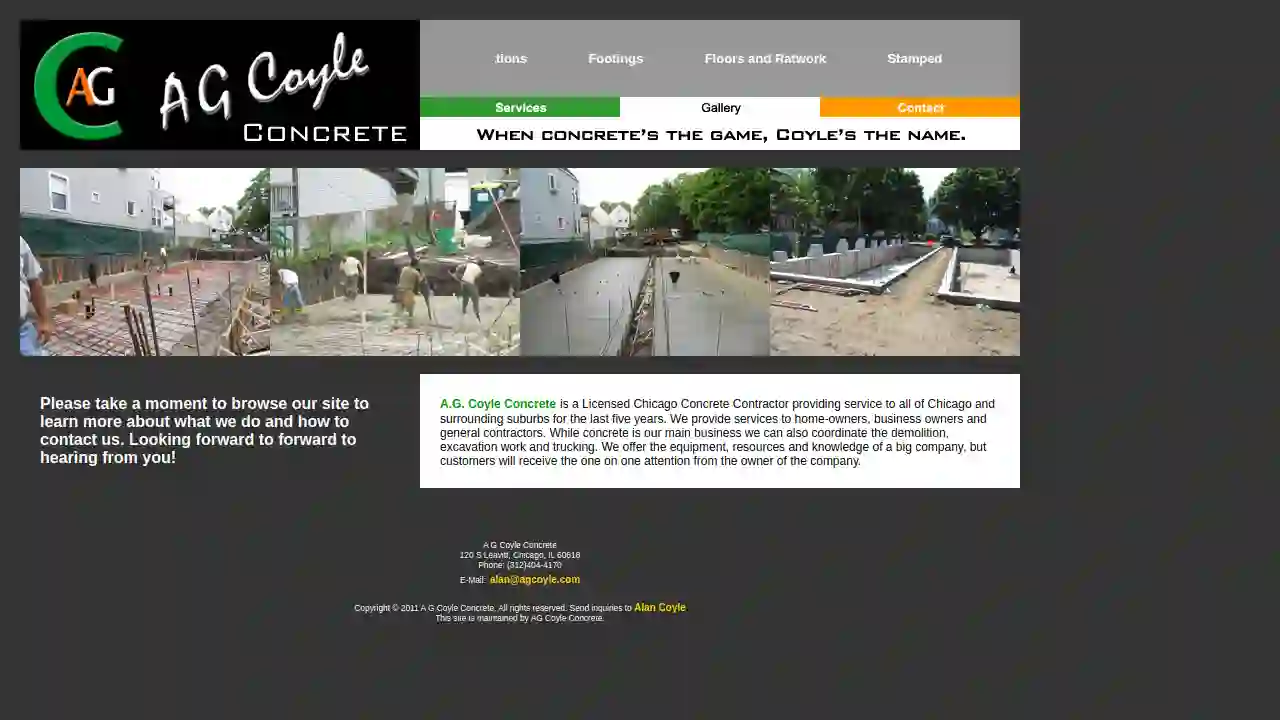
AG Coyle Concrete
120 S Leavitt, Chicago, 60618, USA.G. Coyle Concrete: Your Trusted Chicago Concrete Contractor A.G. Coyle Concrete is a licensed and experienced Chicago concrete contractor serving the city and its surrounding suburbs for the past five years. We are dedicated to providing top-notch concrete services to homeowners, business owners, and general contractors alike. While concrete is our core expertise, we also offer a comprehensive range of services, including demolition, excavation, and trucking. We bring the resources and knowledge of a larger company, but with the personalized attention you'd expect from a family-owned business.
- Services
- Why Us?
- Gallery
Get Quote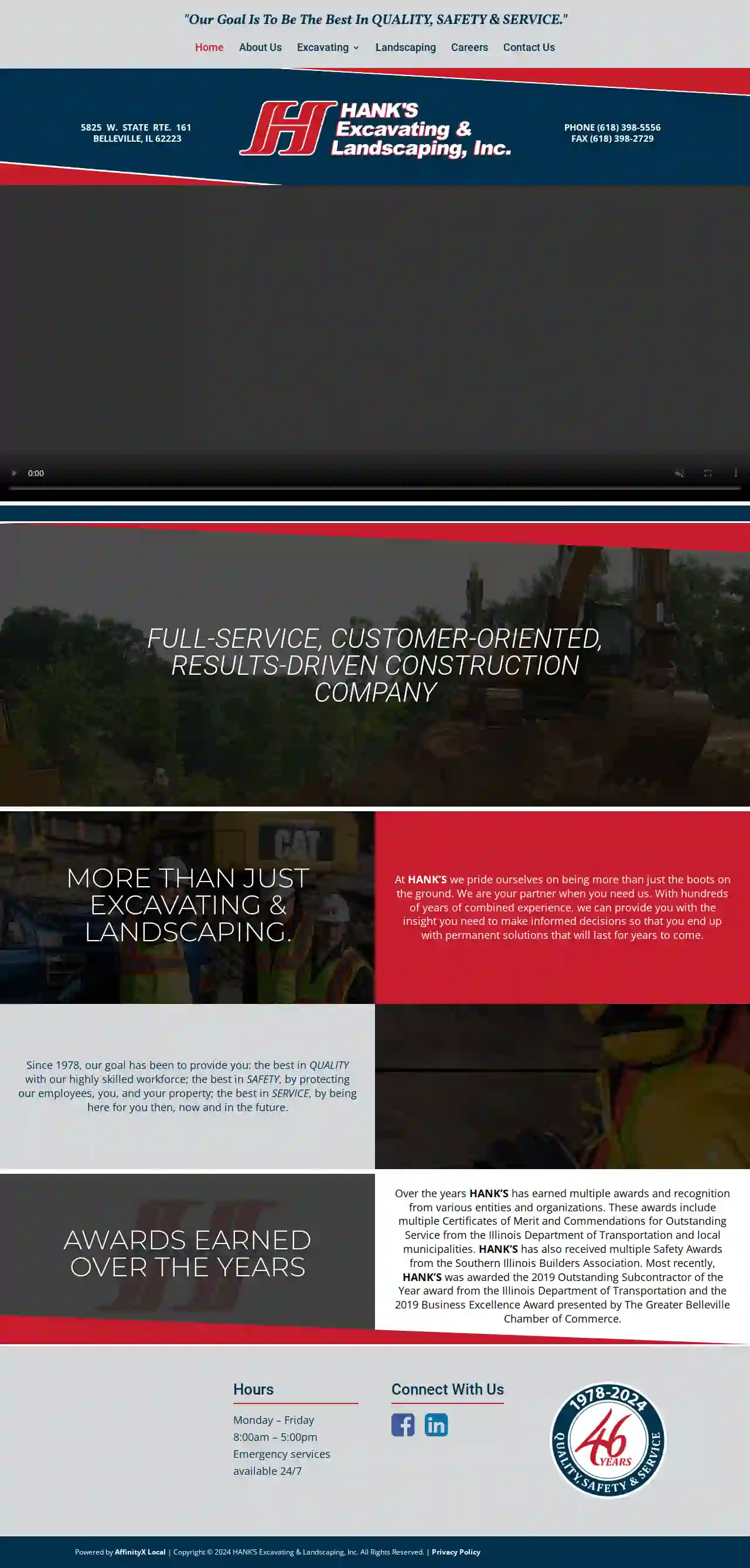
Hank's Excavating & Landscaping Inc
315 reviews5825 W. State Rt. 161, Belleville, 62223, USMore than just Excavating & Landscaping. At HANK’S, we pride ourselves on being more than just the boots on the ground. We are your partner when you need us. With hundreds of years of combined experience, we can provide you with the insight you need to make informed decisions so that you end up with permanent solutions that will last for years to come. Since 1978, our goal has been to provide you: the best in QUALITY with our highly skilled workforce; the best in SAFETY, by protecting our employees, you, and your property; the best in SERVICE, by being here for you then, now and in the future. Building the project is only one aspect of what we do Since 1978, our goal has been to provide you: the best in QUALITY with our highly skilled workforce; the best in SAFETY, by protecting our employees, you, and your property; the best in SERVICE, by being here for you then, now and in the future. Awards earned over the years Over the years HANK’S has earned multiple awards and recognition from various entities and organizations. These awards include multiple Certificates of Merit and Commendations for Outstanding Service from the Illinois Department of Transportation and local municipalities. HANK’S has also received multiple Safety Awards from the Southern Illinois Builders Association. Most recently, HANK’S was awarded the 2019 Outstanding Subcontractor of the Year award from the Illinois Department of Transportation and the 2019 Business Excellence Award presented by The Greater Belleville Chamber of Commerce.
- Services
- Why Us?
- Gallery
Get Quote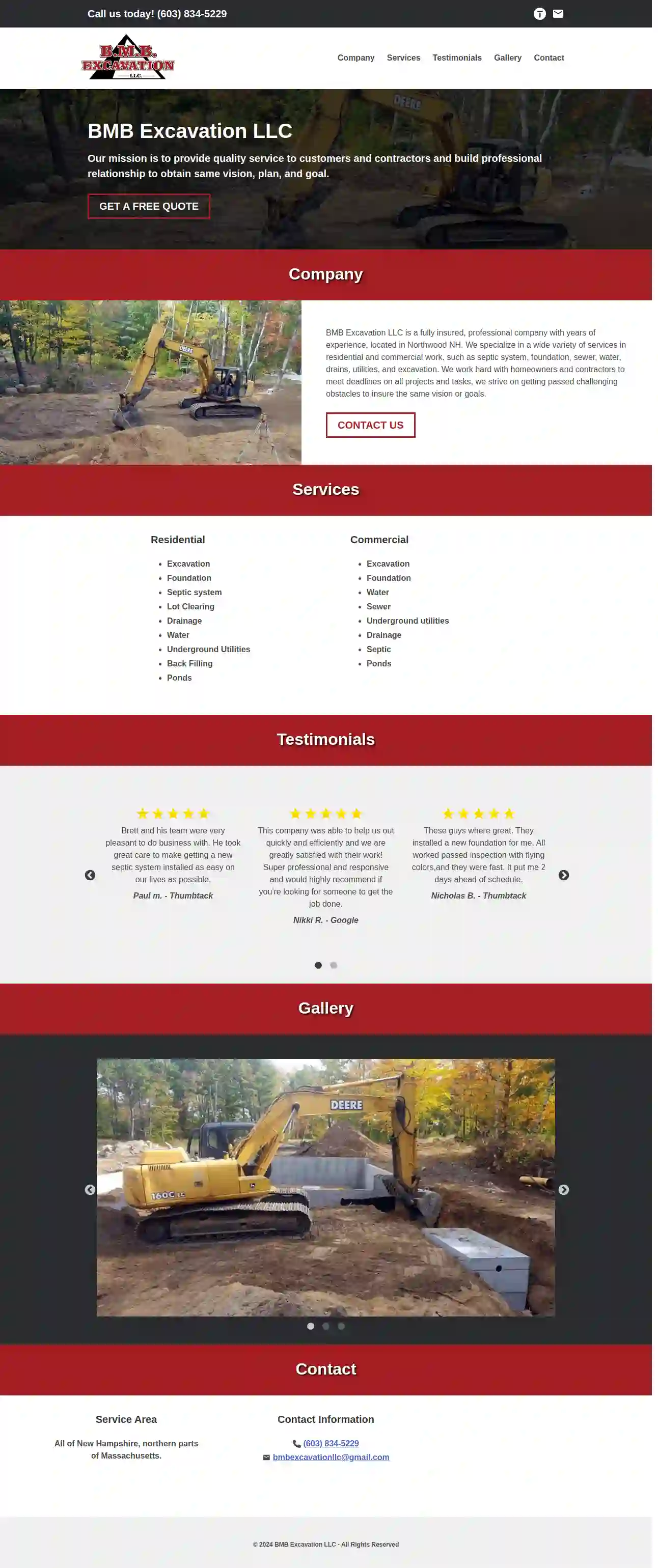
BMB Excavation LLC
44 reviewsNorthwood, USBMB Excavation LLC BMB Excavation LLC is a fully insured, professional company with years of experience, located in Northwood NH. We specialize in a wide variety of services in residential and commercial work, such as septic system, foundation, sewer, water, drains, utilities, and excavation. We work hard with homeowners and contractors to meet deadlines on all projects and tasks, we strive on getting passed challenging obstacles to insure the same vision or goals. Our mission is to provide quality service to customers and contractors and build professional relationship to obtain same vision, plan, and goal.
- Services
- Why Us?
- Testimonials
- Gallery
Get Quote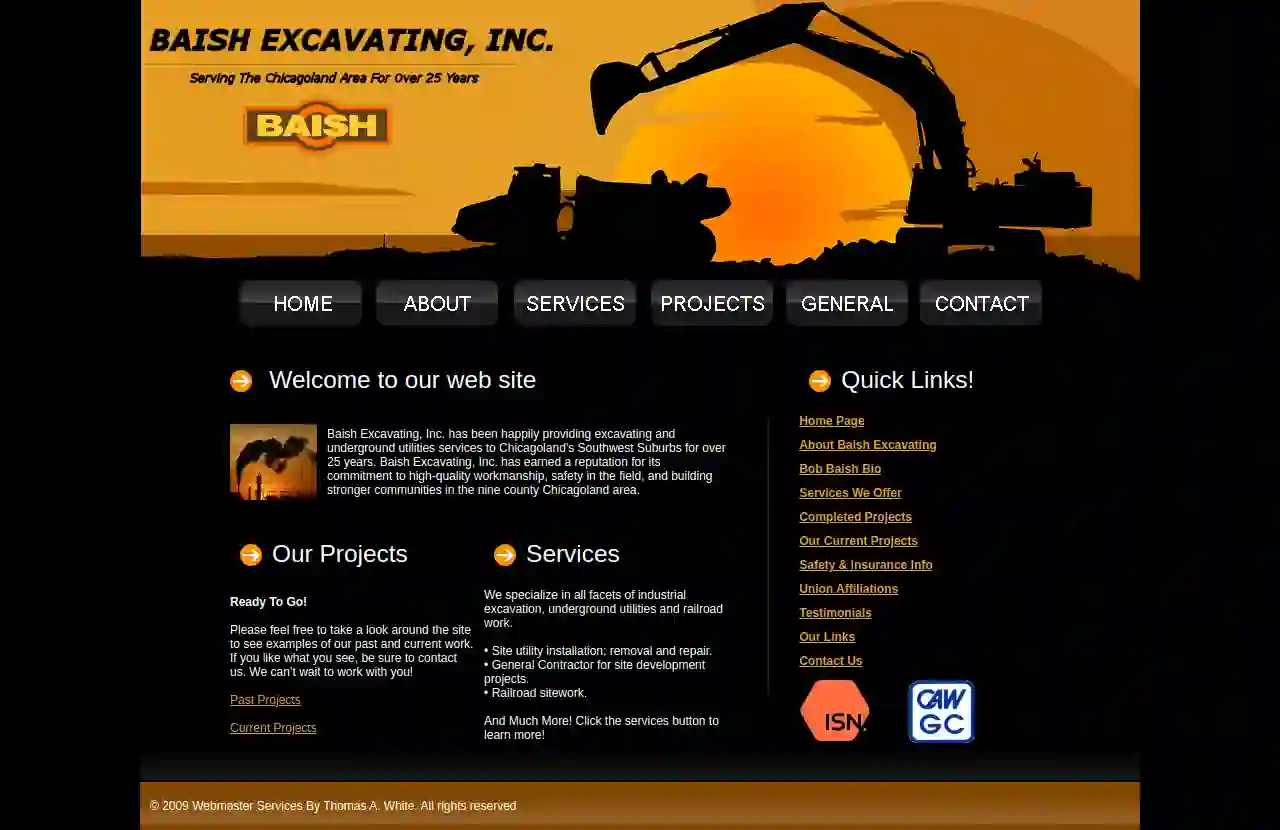
Baish Excavating, Inc.
3485-B Rt 126, Oswego, 60543, USBaish Excavating: Building Stronger Communities For over 30 years, Baish Excavating, Inc. has been a trusted name in Will County, Grundy County, and surrounding communities. A member of the Contractor's Association of Will and Grundy Counties since 1991, Baish Excavating, Inc. contributes to projects that build businesses, renovate the land and benefit the local economy. In 1985, Bob Baish founded Baish Excavating because he saw the need for high-quality excavating and underground utilities services in his community � an area that had the potential for immense residential and industrial growth. With that vision in mind, he rented a shop on Plainfield-Naperville Road in Plainfield, Illinois with a modest crew of three men (one of which was Bob�s dad, Art) and four machines. Today, the shop has upgraded in size and houses 35 pieces of machinery. The crew and staff has expanded along with the size of the workload, but the same old work ethic applies: Baish Excavating, Inc. is committed to building stronger local communities, one job at a time.
- Services
- Why Us?
- Our Team
- Testimonials
- Gallery
Get Quote- Ry
Ryan Excavating
51 reviewsChicago, USFacebook is a social networking service and website launched in February 2004, owned by Meta Platforms. It is the largest social network in the world, with over 2.91 billion monthly active users as of the first quarter of 2023. Users can create a personal profile, add other users as friends, and exchange messages, photos, and videos. Facebook is also used by businesses to connect with customers and promote their products and services. The site has been criticized for its role in the spread of misinformation, its impact on mental health, and its privacy practices.
- Services
- Why Us?
- Gallery
Get Quote 
McHenry Excavating, Inc
4.934 reviews1903 State Rte 31, Suite A, McHenry, 60050, USWelcome to McHenry Excavating, Inc. Commercial & Residential Demolition Pool & Concrete Removal Excavation Sewer & Water Grading Hauling & Removal Helical Piles Under-Pinning Chicagoland’s 24/7 Demolition and Excavation Experts As the Chicagoland area’s demolition and excavation experts since 2006, McHenry Excavating, Inc. is a family-owned and -operated company specializing in residential, commercial and industrial services. Serving McHenry, Lake, DuPage and Cook Counties alike, we’re also highly skilled in grading, dredging, hauling, trenching and concrete removal services. No job is too challenging for our experienced crew. Whether you have a short project timeline or a small budget to work with, give us a call to see what we can do for you. ABOUT US If We Can’t Do It, It Can’t Be Done We take great pride in providing outstanding customer service and support and have the expertise, professionalism, and experience necessary to complete every job safely and efficiently. Because we understand that no two projects are ever the same, we make it our mission to identify your every need to precisely execute your projects to your complete satisfaction. From your project’s conception to its completion, we’re there for you every step of the way! No matter how large or small, you can rest assured that you’re always in good hands when you choose McHenry Excavating, Inc. to handle your project. CONTACT US Why Choose McHenry Excavating, Inc.? Certified, Licensed & Bonded 24/7 Emergency Response Free In-Home/On-Site Estimates 100% Customer Satisfaction Reliable & Affordable Pricing Utmost Commitment to Safety No Project’s Too Large or Too Small Experienced and Trained Staff
- Services
- Why Us?
- Testimonials
- Gallery
Get Quote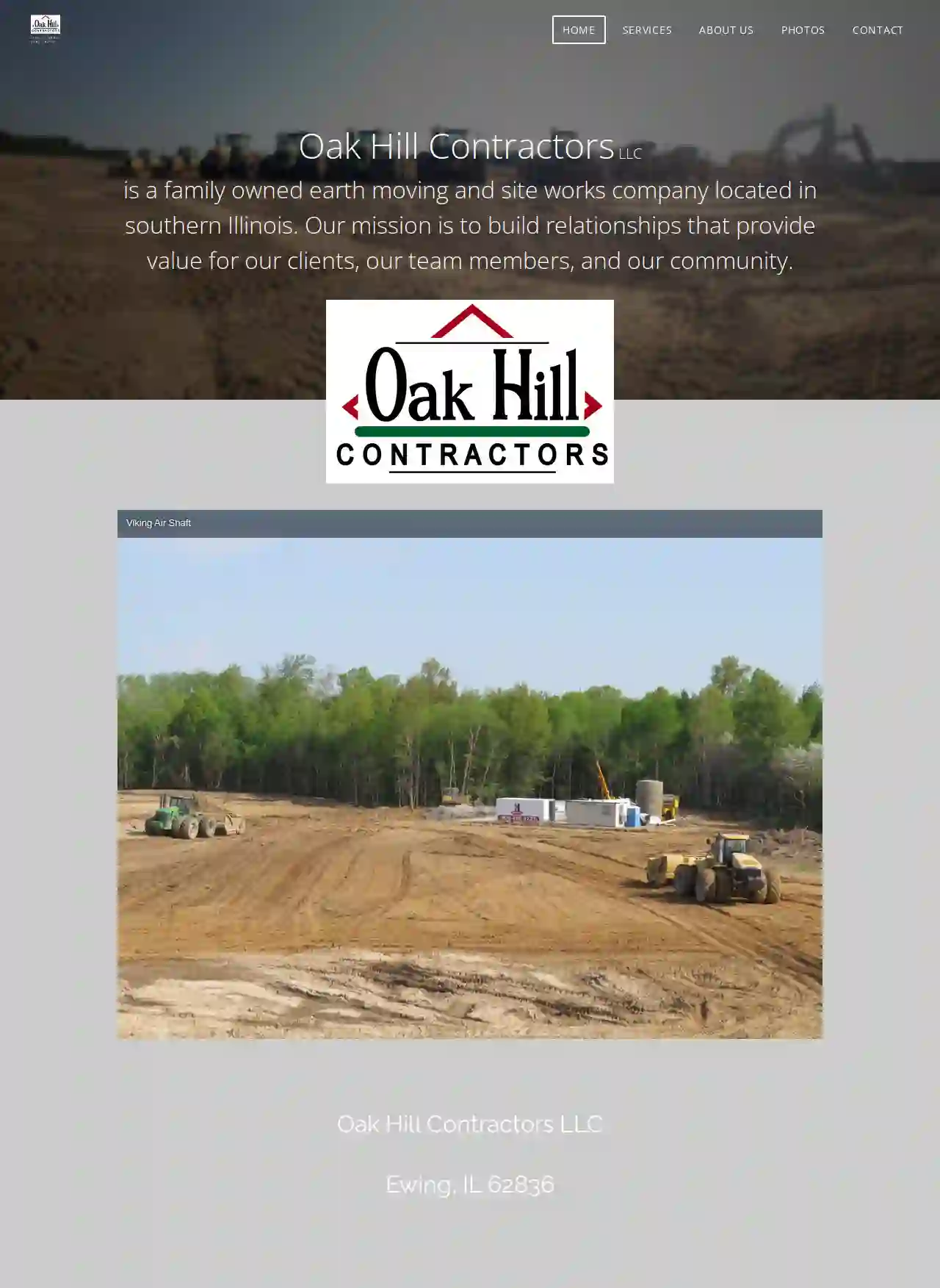
Oak Hill Contractors LLC
53 reviews20245 Ewing Road, Ewing, 62836, USAbout Oak Hill Contractors LLC Oak Hill Contractors LLC is a family-owned earth moving and site works company based in southern Illinois. We are dedicated to building strong relationships with our clients, team members, and the community, ensuring value for everyone involved. Our commitment to quality work and a wide range of equipment allows us to handle projects of all sizes. We utilize GPS-equipped machines for efficient and accurate grading work, ensuring precision and timely completion. We are proud to be Prequalified by IDOT and have MSHA-trained personnel. We are also fully insured, providing peace of mind to our clients. Take a look at one of our recent projects: Sugar Camp Refuse Expansion.
- Services
- Why Us?
- Gallery
Get Quote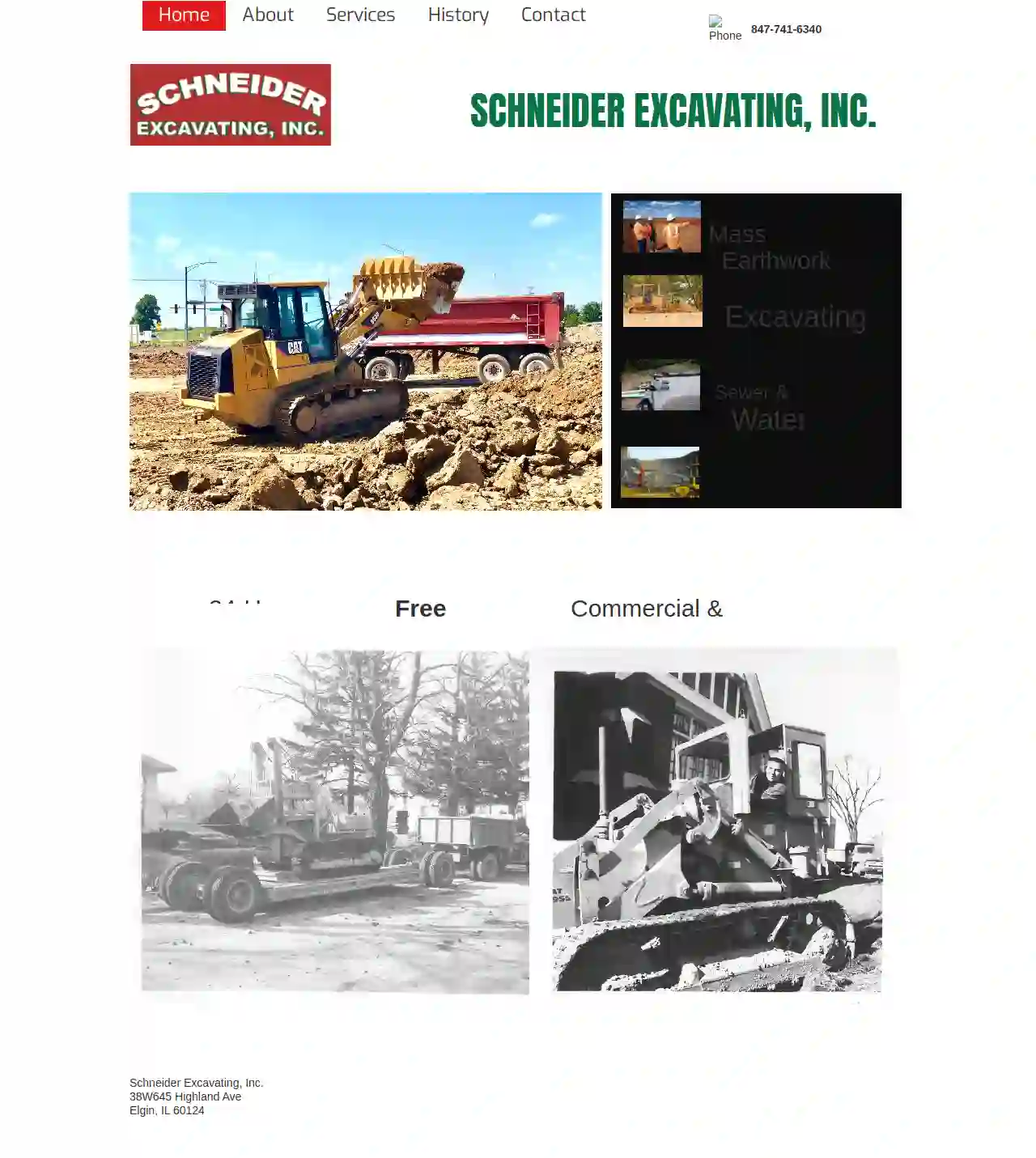
Schneider Excavating Inc.
52 reviews38W645 Highland Ave, Elgin, 60124, USAbout Schneider Excavating, Inc. Established in 1932, Schneider Excavating, Inc. strives to be the go-to company for all your excavation needs. We specialize in Mass Earthwork, Excavating, Sewer & Water, and Demolition, offering a level of expertise that sets us apart from other contractors. With over 85 years of experience, we've become experts in excavating for virtually any project. Beyond our contracting certifications, we adhere to strict industry guidelines, incorporating standards set by the EPA and OSHA. This commitment ensures every project detail is addressed, resulting in exceptional work. We are dedicated to doing right by those who place their trust in us. Proudly serving Elgin & the Fox Valley since 1932, Schneider Excavating, Inc. is here to assist you, whether you have a 50-acre site requiring hundreds of thousands of cubic yards of earth movement or a small municipal site with minor infrastructure additions. Many of our clients are Design/Build contractors with projects ranging from 30,000 square feet to a million square feet. We work closely from budget to build-out, ensuring we stay on schedule and within budget. We have collaborated with a wide range of Contractors, Project Managers, Engineering Firms, Architects, and Private Companies in and around the Elgin area. No matter the size, scope, or uniqueness of your project, we can provide references for your specific type of work. Feel free to contact us anytime!
- Services
- Why Us?
- Our Team
- Testimonials
- Gallery
Get Quote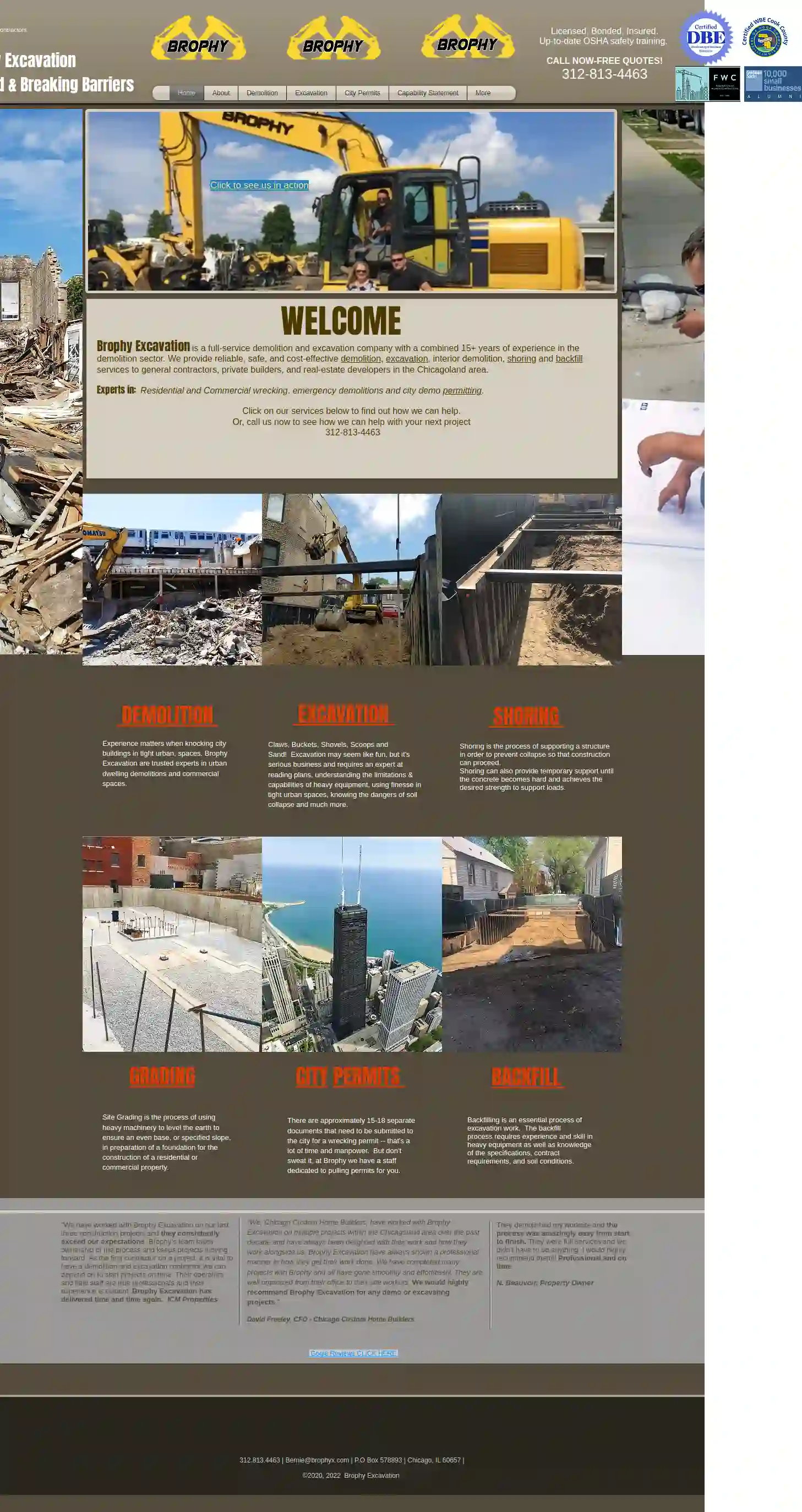
Brophy Excavation-Demolition
4.86 reviewsP.O Box 578893, Chicago, 60657, USBrophy Excavation: Your Trusted Partner for Demolition and Excavation in Chicago Brophy Excavation is a full-service demolition and excavation company with over 15 years of experience in the Chicagoland area. We provide reliable, safe, and cost-effective services to general contractors, private builders, and real estate developers. Our team of experts is dedicated to delivering exceptional results on every project, no matter how big or small. We specialize in: Residential and Commercial Wrecking Emergency Demolitions City Demo Permitting Excavation Shoring Grading Backfill At Brophy Excavation, we understand the importance of safety and efficiency. We are fully licensed, bonded, and insured, and our team is up-to-date on all OSHA safety training. We are committed to providing our clients with the highest level of service and professionalism. Contact us today for a free quote and let us help you with your next project.
- Services
- Why Us?
- Testimonials
- Gallery
Get Quote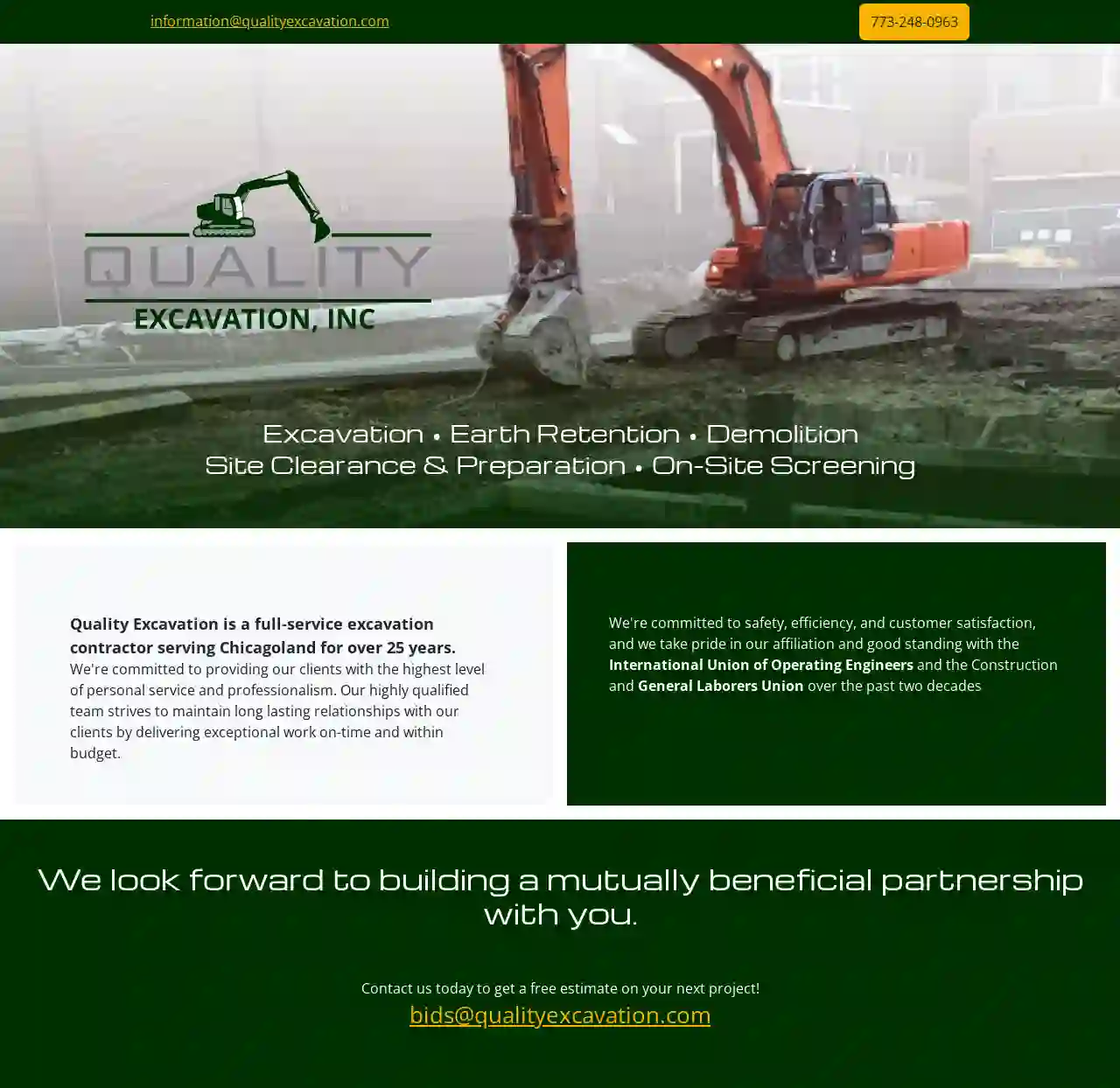
Quality Excavation Inc
54 reviewsChicago, USQuality Excavation: Your Trusted Chicagoland Excavation Partner Quality Excavation is a full-service excavation contractor serving Chicagoland for over 25 years. We're dedicated to providing our clients with the highest level of personalized service and professionalism. Our highly skilled team is committed to building lasting relationships by delivering exceptional work on time and within budget. We prioritize safety, efficiency, and customer satisfaction. We're proud of our strong affiliations and good standing with the International Union of Operating Engineers and the Construction and General Laborers Union over the past two decades. We look forward to building a mutually beneficial partnership with you. Contact us today for a free estimate on your next project!
- Services
- Why Us?
Get Quote
Over 22,076+ Excavation Pros in our network
Our excavation contractors operate in Lindenhurst & surroundings!
ExcavationHQ has curated and vetted Top Excavation Contractors arround Lindenhurst. Find the most trustworthy pro today.
Frequently Asked Questions About Demolition Contractors
- Waste Generation: Demolition generates a large volume of debris, contributing to landfill space and potentially releasing harmful substances into the environment if not disposed of properly.
- Air Pollution: Dust and particulate matter released during demolition can impact air quality, affecting human health and the environment.
- Noise Pollution: Demolition activities can generate significant noise, disturbing nearby residents and wildlife.
- Resource Depletion: Demolition consumes resources that could be salvaged and reused, contributing to resource depletion and environmental degradation.
- Enclosure: Sealing off the asbestos-containing material to prevent fiber release.
- Encapsulation: Coating the asbestos-containing material with a sealant to bind the fibers.
- Removal: Carefully removing the asbestos-containing material and disposing of it safely.
What are the environmental impacts of demolition?
How long does a demolition project take?
What are the different methods of asbestos abatement?
How can I tell if my building contains asbestos?
What are the environmental impacts of demolition?
- Waste Generation: Demolition generates a large volume of debris, contributing to landfill space and potentially releasing harmful substances into the environment if not disposed of properly.
- Air Pollution: Dust and particulate matter released during demolition can impact air quality, affecting human health and the environment.
- Noise Pollution: Demolition activities can generate significant noise, disturbing nearby residents and wildlife.
- Resource Depletion: Demolition consumes resources that could be salvaged and reused, contributing to resource depletion and environmental degradation.
How long does a demolition project take?
What are the different methods of asbestos abatement?
- Enclosure: Sealing off the asbestos-containing material to prevent fiber release.
- Encapsulation: Coating the asbestos-containing material with a sealant to bind the fibers.
- Removal: Carefully removing the asbestos-containing material and disposing of it safely.